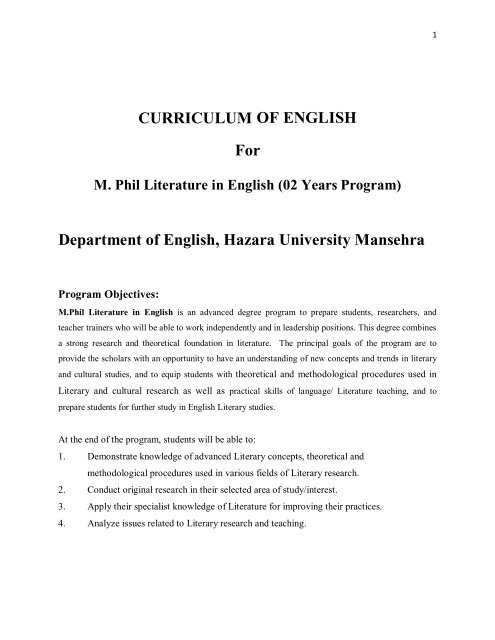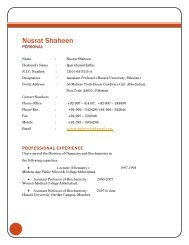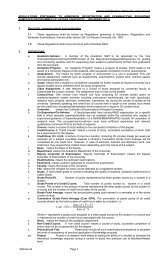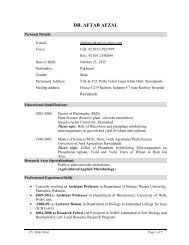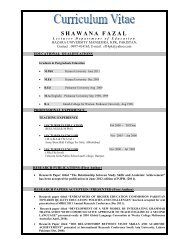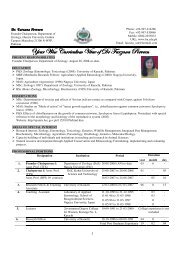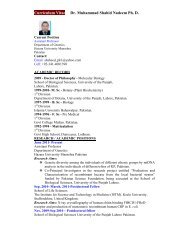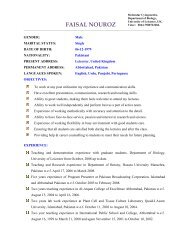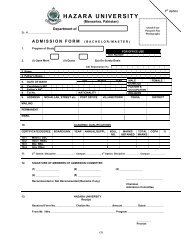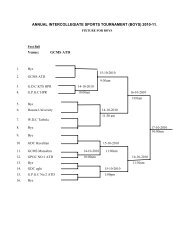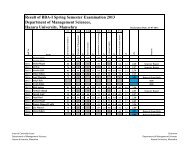Scheme of Studies & Detailed Course Outline - Hazara University
Scheme of Studies & Detailed Course Outline - Hazara University
Scheme of Studies & Detailed Course Outline - Hazara University
Create successful ePaper yourself
Turn your PDF publications into a flip-book with our unique Google optimized e-Paper software.
1<br />
CURRICULUM OF ENGLISH<br />
For<br />
M. Phil Literature in English (02 Years Program)<br />
Department <strong>of</strong> English, <strong>Hazara</strong> <strong>University</strong> Mansehra<br />
Program Objectives:<br />
M.Phil Literature in English is an advanced degree program to prepare students, researchers, and<br />
teacher trainers who will be able to work independently and in leadership positions. This degree combines<br />
a strong research and theoretical foundation in literature. The principal goals <strong>of</strong> the program are to<br />
provide the scholars with an opportunity to have an understanding <strong>of</strong> new concepts and trends in literary<br />
and cultural studies, and to equip students with theoretical and methodological procedures used in<br />
Literary and cultural research as well as practical skills <strong>of</strong> language/ Literature teaching, and to<br />
prepare students for further study in English Literary studies.<br />
At the end <strong>of</strong> the program, students will be able to:<br />
1. Demonstrate knowledge <strong>of</strong> advanced Literary concepts, theoretical and<br />
methodological procedures used in various fields <strong>of</strong> Literary research.<br />
2. Conduct original research in their selected area <strong>of</strong> study/interest.<br />
3. Apply their specialist knowledge <strong>of</strong> Literature for improving their practices.<br />
4. Analyze issues related to Literary research and teaching.
2<br />
<strong>Scheme</strong> <strong>of</strong> <strong>Studies</strong>: M. Phil Literature in English ( 02-Years Program)<br />
YEAR-01<br />
YEAR-01<br />
YEAR-02<br />
SEMESTER-I<br />
SEMESTER-II<br />
SEMESTER - III + IV<br />
Total Credits:50<br />
(24 C.Hr <strong>Course</strong> Work<br />
+ 1 C.Hr Seminar &<br />
(<strong>Course</strong> Work)<br />
12 CH<br />
(<strong>Course</strong> Work)<br />
12 CH<br />
(MLit-831. Seminar +<br />
MLit-841. Thesis)<br />
+ 25 C.Hr Thesis)<br />
1 + 25 = 26 CHr<br />
Core <strong>Course</strong>s<br />
(Total: 02 in both<br />
semesters)<br />
MLit-711.* Literary Criticism<br />
and Theory (Core)<br />
MLit-721. Research Methodology<br />
(Core)<br />
Elective<br />
<strong>Course</strong>s<br />
(Total:06 in both<br />
semesters / 3 in each<br />
semester)<br />
MLit-712. Shakespeare <strong>Studies</strong><br />
MLit-713. Aesthetics & Literary<br />
Genres<br />
MLit-714. American Literature<br />
MLit-715. Romantic Aesthetics<br />
MLit-716. Women’s Writings<br />
MLit-717. South Asian<br />
Literature<br />
MLit-718. Pakistani<br />
Literature<br />
MLit-719. Continental<br />
Literature<br />
MLit-722. Modern Poetry<br />
MLit-723. Modern Fiction<br />
MLit-724. Modern Drama<br />
MLit-725. World Literature in<br />
Translation<br />
MLit-726. Postcolonial <strong>Studies</strong><br />
MLit-727. Emerging Forms <strong>of</strong> Literature<br />
MLit-728. Afro-American<br />
Literature<br />
MLit-729. Science Fiction & Fantasy<br />
Thesis Writing<br />
(20,000 to 25,000 Words)<br />
*In course code ‘MLit-711, ‘MLit’ stands for ‘M.Phil Literature in English, ’first figure (7) shows<br />
the year, second figure (1) represents the semester and the third figure (1) stands for the<br />
course number. The rest <strong>of</strong> the courses are numbered in the same manner.<br />
Note: Besides the two required core courses (“Literary Criticism and Theory” and “Research<br />
Methodology”) the other courses are <strong>of</strong>fered as elective ones to cater to the individual needs and interests.<br />
Each course is <strong>of</strong> 03 Credit Hours (CH) as per requirement <strong>of</strong> the <strong>University</strong>. The students/candidates will<br />
have to select 03 elective courses apart from 01 core course in each <strong>of</strong> the first 2 semesters. In total the<br />
candidates will be studying 08 courses to complete the required credit hours <strong>of</strong> the coursework, i.e. 24<br />
CH; the students will then conduct a Seminar (01 CH) and thesis (25 CH). The candidates will be advised<br />
to select elective courses that pertain to their individual research interests.
3<br />
<strong>Detailed</strong> <strong>Course</strong> <strong>Outline</strong>:M. Phil literature in English (02-Years Program)<br />
SEMESTER I<br />
1. Literary Criticism & Theory (Core <strong>Course</strong>)<br />
Rationale:<br />
This intensive core course is an important and foundational requirement for any onward literary study<br />
and research. The course introduces a historical and multidisciplinary development <strong>of</strong> literary and<br />
critical approaches that later develop into theory, process <strong>of</strong> theorizing and its inter-textual growth.<br />
The course is divided into two sections:<br />
‣ Classical, Neo-Classical, and 19 th century schools <strong>of</strong> thought (A Recap)<br />
‣ Some Modern, Postmodern, and Contemporary approaches<br />
The rationale is to debate and connect these comparisons produced over the growing critical insights to<br />
find answer for why and how “Criticism” translates into “Theory.”<br />
SUGGESTED PRIMARY READING:<br />
Part I (A Recap, If Required)<br />
‣ Early Classical Period: Selections from Plato’s Republic; Aristotle’s Poetics<br />
‣ The Classics and the Neo-Classics: Selections from Sir Philip Sidney’s<br />
The Defence <strong>of</strong> Poesie, John Dryden’s Essay on Dramatic Poesie.<br />
‣ The Romantics and the Victorians: Selections from William Wordsworth’s Preface to the<br />
Lyrical Ballads; Samuel Taylor Coleridge’s Biographia Literaria (Chapters 14, 17, 18);<br />
Mathew Arnold’s Culture and Anarchy<br />
Part II (A Recap, if Required)<br />
‣ Modern And New Criticism: Selections from T.S. Eliot’s Tradition and the Individual<br />
Talent and Other Essays; F. R. Leavis’s “Literary Criticism and Philosophy” from The<br />
Common Pursuit; Cleanth Brookes’s The Well Wrought Urn (selections), I.A. Richards’s<br />
Principles <strong>of</strong> Literary Criticism (selections)<br />
‣ Other selected Modern Euro-American trends from Catherine Belsey, Critical Practice.<br />
London: Routledge, 1980; K. M. Newton, ed. Twentieth Century Literary Theory: A<br />
Reader. Second Edition. New York: St. Martin's 1998. Vincent B. Leitch (General<br />
Editor). The Norton Anthology <strong>of</strong> Theory and Criticism. New York & London: W.<br />
W. Norton and Company, 2001 (or later editions)<br />
CORE COURSE:<br />
The main emphasis will be on the following issues and aspects:<br />
1. Postcolonial-With emphasis on Racial, National, and Global<br />
2. Postmodern-With emphasis on Popular, Cyber-Spatial, and Technological<br />
3. Linguistic-With emphasis on Structural, Post-structural, Translation<br />
4. Psychoanalytic-With emphasis on Psycho and Socio-pathological<br />
5. Reception – With emphasis on Interpretation, Hermeneutics, Reader- Response<br />
6. Marxist – With emphasis on Economic, Social and Cultural<br />
7. Feminist – With emphasis on Gender and Sexuality <strong>Studies</strong><br />
8. Myth-o-poetic – With emphasis on Archetypal, Phenomenal, and Genre based<br />
9. Theories about Inter-textuality – With emphasis on Comparative World<br />
Literatures, institutions and canons
4<br />
Suggested Secondary Readings:<br />
1. Ashcr<strong>of</strong>t, Bill, et al. The Empire Writes Back: Theory and Practice in Post-Colonial<br />
Literature. London: Routledge, 1989. (For Postcolonial Theory)<br />
2. Belsey, Catherine. Critical Practice. London: Routledge, 1980. (For Marxist and Russian<br />
Formalist Theory)<br />
3. Benvensite, Emile. Problems in General Linguistics. Miami: Miami UP, 1971. (For<br />
Linguistic, Structuralism, and Poststructuralist Theories)<br />
4. Culler, Jonathan. The Pursuit <strong>of</strong> Signs: Semiotics, Literature, Deconstruction. London:<br />
Routledge, 1981. (For Reader-oriented Theory)<br />
5. Docherty, Thomas. Ed. Postmodernism: A Reader. Hemal Hempstead: Harvester Wheatsheaf,<br />
1992. (For Postmodern Theory)<br />
6. Eagleton, Mary. Ed. Feminist Literary Criticism. London: Longman, 1991. (For Feminist Theory)<br />
7. Eliot, T.S. Selected Essays. London: Faber & Faber, 1965. (For New Criticism, Moral<br />
Formalism, and F. R. Leavis)<br />
8. Lodge, David. Ed Twentieth Century Literary Criticism. London: Longman, 1972. (For<br />
Introduction)<br />
9. Vincent B. Leitch (General Editor). The Norton Anthology <strong>of</strong> Theory and Criticism. New York &<br />
London: W.W. Norton and Company, 2001 (or later editions). (For all the various approaches,<br />
and topic and author-wise selections)<br />
10. Wright, Elizabeth. Psychoanalytic Criticism: Theory in Practice. London: 1984. (For Pychoanalytic<br />
Theory)<br />
Elective <strong>Course</strong>s (Semester 1)<br />
2. SHAKESPEARE STUDIES:<br />
Rationale:<br />
Any two <strong>of</strong> Shakespeare’s most celebrated four tragedies, one pure romantic comedy, and a drama<br />
<strong>of</strong> his mature age is an adequately fair selection <strong>of</strong> Shakespeare’s works. His history plays are not<br />
generally anthologized except for the Henry plays wherein the great Sir John Falstaff appears. His<br />
poems ought to have a separate <strong>Course</strong>. A comedy or any drama, for that matter, may be replaced by<br />
another one keeping its suitability and the scope <strong>of</strong> the <strong>Course</strong> in view. Shakespeare, <strong>of</strong> course, is<br />
such a comprehensive artist who compels readers to read all <strong>of</strong> his works and resists selections.<br />
But such voluminous poet and dramatist would demand four to five courses for extensive reading<br />
which cannot be part <strong>of</strong> our MA English programme. Hence the given list <strong>of</strong> plays is considered as<br />
proper selection for this course.<br />
Suggested Primary Reading:<br />
1. Macbeth / King Lear (Any one <strong>of</strong> the two)<br />
2. Hamlet / Othello (Any one <strong>of</strong> the two)<br />
3. A Midsummer Night’s Dream<br />
4. The Tempest<br />
Suggested Secondary and Specific Readings:<br />
1. Barber, C. L. Shakespeare‟s Festive Comedy. Princeton: 1959<br />
2. Bloom, Harold. Shakespeare: The Invention <strong>of</strong> the Human. London: Fourth Estate, 1999<br />
3. Bradley, A. C. Shakespearean Tragedy (22 nd Ed.). London: 1929<br />
4. Chambers, E. K. Shakespeare: A Survey. New York: Hill and Wang, Macmillan, 1925
5<br />
5. Eagleton, Terry. William Shakespeare. New York: Blackwell, 1986<br />
6. Erikson, Peter. Rewriting Shakespeare, Rewriting Our-selves. Berkley: U <strong>of</strong> California P, 1991<br />
7. Grady, Hugh. The Modernist Shakespeare: Critical texts in a Materia World. New York:<br />
Oxford UP, 1991<br />
8. Greene, G. et al. Eds. The Women‟s Part: feminist Criticism <strong>of</strong> Shakespeare. Urbana: U<br />
<strong>of</strong> Illinois P, 1980<br />
9. Jones, Earnest. Hamlet and Oedipus. New York: 1949<br />
10. Paul, Henry N. The Royal Play <strong>of</strong> Macbeth. New York: 1950<br />
3. AESTHETICS AND THE LITERARY GENRES<br />
<strong>Course</strong> description: In our times we notice the irony that more the contemporary literary study moves<br />
toward multi- or cross-disciplinary reading the more it grows skeptical <strong>of</strong> the aesthetic. Consequently,<br />
there appears a need to reassert the relevance <strong>of</strong> the aesthetic into the widening repertoire <strong>of</strong> literary<br />
and critical practices. This <strong>of</strong>fers simultaneously a stimulus to research and creativity. One may thus<br />
survey the available central issues in contemporary forms <strong>of</strong> literary aesthetics; the evaluation and<br />
interpretation <strong>of</strong> art, art theories and art philosophies. The aim is to analyze literary aesthetic<br />
experience, especially the one derived from ranging literary genres studied within a scientific<br />
framework as well as a conceptual analysis presented by philosophers. The purpose thus suggests that<br />
the debate within this discipline takes on a very different character if we pay attention to what science<br />
has contributed to the philosophy <strong>of</strong> aesthetics. Topics like digital and cyber-text poetics, ideology and<br />
aesthetics, ethics and aesthetics, and many others along with the selective readings from various<br />
literary texts shall <strong>of</strong>fer an intensive study <strong>of</strong> the complex and changing landscapes <strong>of</strong> literary genre,<br />
criticism and theory today.<br />
<strong>Course</strong> objectives involve an intensive study <strong>of</strong> the:<br />
‣ history <strong>of</strong> literary criticism and its development through representative works<br />
‣ romanticist versus classical literary modes and their revivals in literary history<br />
‣ latest literary terms that equip with thinking and writing skills about forms and genres<br />
‣ intellectual and aesthetic influences affecting literature and language<br />
Some suggested secondary readings apart from the primary literary texts <strong>of</strong> choice are:<br />
1. The Oxford Handbook <strong>of</strong> Aesthetics by Jerrold Levinson (2005)<br />
2. The Blackwell Guide to Aesthetics by Peter Kivy (2004)<br />
3. Aesthetics and the Philosophy <strong>of</strong> Artby Peter Lamarque and Stein H. Olsen (2003)<br />
4. Aesthetics: An Introduction to the Philosophy <strong>of</strong> Art by Anne D. R. Sheppard (1987)<br />
5. The Theory and Aesthetic Evaluation <strong>of</strong> Literature by Mary Francis Slattery (1990)<br />
6. Literary Aesthetics: A Reader by Alan Singer and Allen Dunn (2001)<br />
7. Aesthetics and Literature by David Davies (2007)<br />
8. Literary Aesthetics and the Language Style (Paperback) by Lina Zheng (1991)<br />
9. Aesthetic Experience and Literary Hermeneutics by Hans Robert Jauss (2008)<br />
10. The Ideology <strong>of</strong> the Aesthetic by Terry Eagleton (1991)<br />
4. AMERICAN LITERATURE:<br />
Rationale:<br />
This course surveys the origins <strong>of</strong> American literary movements with reference to the representative<br />
writers chosen. It stresses the diversity and uniqueness <strong>of</strong> the American character and experience, and<br />
the foundational voices <strong>of</strong> self-acclaimed Puritan holiness along with the revolutionary expansions <strong>of</strong>
6<br />
the so- called patriots. It also highlights various phases <strong>of</strong> the American Renaissance, Romantic<br />
awareness and Transcendentalism, the Civil War and scientific progress, dreams <strong>of</strong> American success,<br />
and several voices <strong>of</strong> social protest.<br />
Suggested texts<br />
American Novel:<br />
1. William Faulkner, Light in August<br />
2. Earnest Hemingway, A Farewell to Arms<br />
3. Tony Morrison, Beloved<br />
4. Steinbeck The Grapes <strong>of</strong> Wrath<br />
American Short Story:<br />
1. Edgar Allen Poe, “The Fall <strong>of</strong> the House <strong>of</strong> Usher,” “The Murder in Rue Morgue,” “The<br />
Mask <strong>of</strong> the Red Death”<br />
2. Nathaniel Hawthorne, “The Celestial Railroad”, “The Minister’s Black Veil”, “The Maypole<br />
<strong>of</strong> Mary Mount”, “Young Goodman Brown”<br />
3. Earnest Hemingway, “The Too Big Hearted Rivers”<br />
4. Harriet E Wilson, “A Friend for Nig” from Our Nig<br />
American Poetry:<br />
1. Wallace Stevens, Selections<br />
2. William Carlos William or Ezra Pound, Selections<br />
3. Langston Hughes, Selections<br />
4. Sylvia Plath or Adrienne Rich, Selections<br />
American Drama: (any 4)<br />
1. Eugene O’Neill, Long day’s journey into night<br />
2. Arthur Miller, The Crucible<br />
3. Edward Albee, Who’s Afraid <strong>of</strong> Virginia woolf?<br />
4. Sam Sheppard, The Buried Child<br />
5. David Mamet, American Buffalo<br />
6. August Wilson, Piano Lesson or Fences<br />
7. Lorraine Hansberry, A Raisin in the Sun<br />
8. Marsha Norman, ‘night, Mother<br />
9. Besides, if possible, some <strong>of</strong> the representative plays and poems <strong>of</strong> other minorities in<br />
America from any Norton or Heath Anthology <strong>of</strong> American literature<br />
Suggested Readings:<br />
1. Bloom, Harold. Ed. Modern Critical Views: William Faulkner (Modern Critical Views<br />
Series). New York: Chelsea House, 1986<br />
2. Bradbury, M. Modern American Novel, 1983<br />
3. Brown, Julie. Ed. American Women Short Story Writers: A Collection <strong>of</strong> Critical Essays. New<br />
York: Garland Pub, 1995<br />
4. Chase, R. The American Novel and its Traditions, 1958<br />
5. Gray, R. American Fiction: New Readings, 1983<br />
6. Hardwick, Elizabeth. Herman Melville. Viking Books: 2000
7<br />
5- Romantic Aesthetics:<br />
Rationale: The scope <strong>of</strong> this course does not admit the first Romantic Movement <strong>of</strong> the giants like<br />
Spenser, Sidney and Shakespeare etc. This is also worth mentioning that the romantic literature in fact,<br />
starts from the graveyard school <strong>of</strong> the 18th century primarily known for its classic taste. Poets like<br />
Goldsmith and Gray are justifiably known as precursors <strong>of</strong> romanticism. However, the scope <strong>of</strong> this<br />
course does not admit them as part <strong>of</strong> its reading as well. The period <strong>of</strong> romantic aesthetics covered under<br />
this course starts from 1789 with the advent <strong>of</strong> Blake’s work. This is the romantic revival period in which<br />
Blake, Wordsworth, Coleridge, Shelley, Byron, Keats, Lamb etc establish its immense poetic and prosaic<br />
richness. The course is designed keeping in view the different tastes <strong>of</strong> the romantic revival period that<br />
savours best with the poems selected for it. However the final selection will be up to the <strong>University</strong> or the<br />
teachers concerned.<br />
Suggested Primary Reading:<br />
1. William Blake: Selections from Songs <strong>of</strong> Innocence and Songs <strong>of</strong> Experience<br />
2. William Wordsworth: “The Thorn”; “Old Cumberland Beggar”; “Lines Written in Early<br />
Spring”; “Lines”; “Lucy Poems”; “Lucy Gray”; “Ruth” and other small poem<br />
3. S.T. Coleridge: “Rime <strong>of</strong> the Ancient Mariner”<br />
4. John Keats: “Ode to Nightingale”; “Ode on a Grecian Urn”; “Ode to Psyche”; “Ode on<br />
Melancholy”<br />
5. Charles Lamb: “Dream Children”; “Poor Relations”; “Old China”<br />
6. Shelley: “Ode to the West Wind”; “Hymn to Intellectual Beauty”; “The Cloud”; “Stanzas<br />
Written in Dejection”<br />
Suggested Secondary and Specific Reading:<br />
1. Edward Dowden, The French Revolution and English Literature. 1987.<br />
2. M. H. Abrams, The Mirror and the Lamp: Romantic Theory and Critical Tradition. 1954<br />
3. M. H. Abrams, ed., English Romantic Poets Modern Essays in Criticism. 1960<br />
4. S. F. Damon, William Blake: His Philosophy and Symbolism. 1924<br />
5. J. V. Baker, The Sacred River: Coleridge’s Theory <strong>of</strong> Imagination. 1957<br />
6. J. B. Beer, Coleridge the Visionary. 1959<br />
7. W. J. Bate, ed., Keats: A Collection <strong>of</strong> Critical Essays. 1964<br />
8. George Barnett, Charles Lamb: The Evolution <strong>of</strong> Elia. 1964<br />
9. G. M. Ridenour, Shelley, A Collection <strong>of</strong> Critical Essays. 1965<br />
10. Bennett Weaver, Wordsworth: Poet <strong>of</strong> the Unconquerable Mind. 1965.<br />
6- Women’s Writings:<br />
Rationale: Women’s writings are associated with extensive social and political change. Some <strong>of</strong> these<br />
changes were radical, even revolutionary in the re-definition <strong>of</strong> women’s roles in both private and public<br />
domains. This survey course will focus on representative voices <strong>of</strong> women in literature who express the<br />
challenges <strong>of</strong> changing sensibilities through female experience. Literary texts are drawn from different<br />
genre (poetry, drama and fiction) and the writers included come from different subject positions as<br />
defined by race, nation, and class.<br />
Suggested Primary Reading:<br />
1. Emily Bronte, Selections from Poems<br />
2. Charlotte Bronte, Jane Eyre<br />
3. Jean Rhys, The Wide Sargasso Sea<br />
4. Adrienne Rich, “Aunt Jennifer’s Tigers,” “After Twenty Years,” “Diving into the Wreck”<br />
5. Eavan Boland, “The Journey,” “What Language Did,” “Anna Liffey”<br />
6. Christine Hong-Kingston, The Woman Warrior
8<br />
7. Nella Larsen, Passing<br />
8. Arundhati Roy, The God <strong>of</strong> Small Things<br />
9. Sara Suleri, The Meatless Days<br />
Additional Readings for Presentations:<br />
(The instructor may give any other additional readings)<br />
1. Marjane Satrapi, Persepolis<br />
2. Angela Carter, The Magic Toyshop<br />
3. Toni Morrison, Beloved<br />
4. Linda Hogan, Solar Storms<br />
5. Ismat Chughtai, The Crooked Line<br />
Suggested Secondary Reading:<br />
• Adrienne Rich, Of Woman Born. London: Virago, 1977<br />
• Cora Kaplan, ‘Language and Gender’ in Sea Changes: Essays on Culture and Feminism.<br />
London: Verso, 1986<br />
• Eavan Boland, Selected Poems. Manchester: Carcanet, 1989<br />
• Eavan Boland, Object Lessons. NY: W.W. Norton, 1996<br />
• Eavan Boland, Outside History, Selected Poems 1980-1990. NY, London: W.W. Norton, 1991<br />
• Virginia Woolf, A Room <strong>of</strong> One’s Own. Penguin, 1979<br />
• Cathy N. Davidson and Linda Wagner Martin, The Oxford Companion to Women’s Writing in<br />
the United States. N.Y.Oxford UP, 1995<br />
• Sandra Gilbert and Susan Gubar, The Madwoman in the Attic: The Woman Writer and the<br />
Nineteenth Century Literary Imagination. Yale Note: 2000<br />
• Ruth Robbins, Literary Feminisms. St. Martin’s Press, 2000<br />
7- South Asian Literature<br />
Aims & Objectives:<br />
The aim <strong>of</strong> the course is to familiarize the students with the facility that South Asian Writers have with<br />
the English Language and the regional flavor that they lend to it. It will help generate a debate on the<br />
context <strong>of</strong> a work <strong>of</strong> literature through representation <strong>of</strong> the region by its people.<br />
Contents:<br />
A. Drama (any two)<br />
<br />
<br />
<br />
B. Fiction (any two)<br />
<br />
<br />
Tariq Ali: Iranian Nights<br />
Vijay Tendulkar: Silence! The Court in Session<br />
Girish Karnad: The Dreams <strong>of</strong> Tipu Sultan<br />
Kamila Shamsi: Salt and Saffron<br />
Khalid Hosseini: The Kite Runner<br />
Bapsi Sidhwa: And American Brat<br />
Anita Desai: The Inheritance <strong>of</strong> Loss<br />
Daniyal Moeenudin: In Other Rooms Other people<br />
Mohammed Hanif: A Case <strong>of</strong> Exploding Mangoes<br />
C. Poetry (selections)<br />
Zulfiqar Ghose<br />
Naseem Ezekial<br />
Maki Qureshi<br />
Sujata Bhatt
9<br />
Recommended Readings:<br />
1. Singh, B. P. (1998). The State, The Arts and Beyond. Delhi: Oxford <strong>University</strong> Press.<br />
2. Mirza, Shafqat Tanveer. (1992). Resistance Themes in Punjabi Literature. Lahore: Sang-e-meel.<br />
3. Ed. William Hanaway. <strong>Studies</strong> in Pakistani Popular Culture. Lahore: Lok Virsa Publishing House.<br />
4. Ed. G. N. Devy. (2002). Indian Literary Criticism Theory and Interpretation. Hydrabad: Orient<br />
Longman.<br />
5. Ed. Ranjit Guha. (1984). Subaltern studies Writings on South Asian History and Society. Delhi:<br />
Oxford <strong>University</strong> Press.<br />
6. Brian, Paul. Modern South Asian Literature in English. Westport, Conn: Greenwood, 2003.<br />
7. Spivak, GayatriChakravorty. A Critique <strong>of</strong> Postcolonial Reason: Toward a History <strong>of</strong> the<br />
Vanishing Present. Cambidge, Mass: Harvard <strong>University</strong> Press,1999.<br />
8. San Juan, Epifanio. Beyond Postcolonial Theory. New York: St. Martin’s Press,1998.<br />
9. Brian, Paul. The irrelevance <strong>of</strong> “Postcolonialism” to South Asian Literature. 2008.<br />
8- Pakistani Literature<br />
Aims & Objectives: English language is now a major world language. South Asia has a strong tradition<br />
<strong>of</strong> writing in English and owing to its colonial history a great deal <strong>of</strong> its writing originally in its indigenous<br />
languages is translated into English. It is appropriate to study and respond to this literary heritage. After<br />
studying the course the students will be introduced to literature from the region. They will be able to<br />
appreciate the Pakistani literary experience and the impact <strong>of</strong> cultural exchange towards its enrichment.<br />
Contents:<br />
A. Works originally written in English<br />
Ahmed Ali: Twilight in Delhi (novel)<br />
Bapsi Sidhwa: Breaking it Up (essay)<br />
Aamir Hussain: Sweet Rice (poem)<br />
Tahira Naqvi: Attar <strong>of</strong> Roses (poem)<br />
Daud Kamal: An Ode to Death<br />
Alamgir Hashmi: In Cordoba<br />
Tariq Rahman: Short Stories (Any two)<br />
B. Translations<br />
Bulleh Shah: A Selection. Translated by Taufiq Rafat (Any three)<br />
Shah Abdul Latif Bhittai: any five poems<br />
Sachal Sarmast: any five poems<br />
Al-Hajweri: Revelation <strong>of</strong> the Mystery (prose) by R. A. Nicholson<br />
Allama M. Iqbal: Poems From Iqbal a translation by V. G.Kiernan<br />
Faiz Ahmad Faiz: Poems Translated by Ikram Azam (Any three)<br />
Ahmad Nadeem Qasmi: Short Stories Translated by Sajjad Shaikh (Any two)<br />
Recommended Readings:<br />
1. Afzal-Khan, Fawzia. (1993) Cultural Imperialism and the Indo-English: Genre and ideology<br />
in R. K. Narayan, Anita Desai, Kamla Das and Markandaya. Pennsylvania State <strong>University</strong><br />
Press.<br />
2. Hashmi, Alamgir. (1994) Kamal Daud‟s Entry in Encyclopaedia <strong>of</strong> Post- Colonial Literatures
10<br />
in English. Vol 1. Ed Benson E.& Connolly, L W. London: Routledge.<br />
3. Khawaja Waqas A. Morning in the Wilderness: Reading in Pakistani Literature. Sang-e-Meel<br />
Publications, Lahore.<br />
4. Rahman, Tariq A. (1991) History <strong>of</strong> Pakistani Literature in English.Vanguard Press (Pvt) Ltd,<br />
Lahore.<br />
5. Said Edward W. (1993) Culture and Imperialism, Vintage London.<br />
6. Underhill, Evelyn. (2007).The Essentials <strong>of</strong> Mysticism. Oxford: Oxford Oneworld.<br />
7. Ernst, Carl W. (1997). The Shambhala Guide to Sufism. Delhi: India.<br />
9- Continental Literature<br />
Aims & Objectives: The aim is to encourage the readers to discover the dominant dramaturgical<br />
traditions in the history <strong>of</strong> Western drama and performance and to explore how modernist experiments<br />
with the constituent elements <strong>of</strong> plot, characterization, language, setting, movement, or theme challenge<br />
these traditions.<br />
Contents: (any five)<br />
Henrik Ibsen: Pillars <strong>of</strong> Society<br />
August Strindberg: Ghost Sonata<br />
Ligui Pirandello: Six Characters in Search <strong>of</strong> an Author<br />
Harold Pinter: The Caretaker<br />
Garcia Lorca: Blood Wedding<br />
Baudelaire: Any Five Poems<br />
Kafka: Any Three Short Stories/Letter to his Father translated as<br />
Dearest Father<br />
Herman Hesse: Sight <strong>of</strong> Chaos (Any <strong>of</strong> the essays)<br />
Bertold Brecht: Three penny Opera<br />
Gail Jones’ Sorry. Europa, 2008.<br />
Jean Devanny’s Sugar Heaven. Readback Press, 1982.<br />
Christina Stead’s The Man who loved children.Victory Books, 2010<br />
Recommended Readings:<br />
1. Bloom, H. Ed. (1980) Modern critical views and interpretation.<br />
2. Bishop, Thomas. (1961) Pirandello and the French Theatre. New York.<br />
3. Campbell, George A. (1933) Strindberg. New York.<br />
4. Gray, Ronald. (1961) Bertolt Brecht. New York.<br />
5. Kitchin, L. (1960) Mid-Century Drama. London (For Osborne)<br />
5. Lane, Richard. Ed. (2002) Beckett and Philosophy, Palgrave Macmillan.<br />
6. Lumley, Fredrik. (1960) Trends in 20 th Century Drama. Fairlawn.<br />
7. Northam, John. (1953) IBA/BSen‟s Dramatic Method. London.<br />
8. Pronko, Lenard Cabell. (1951) The World <strong>of</strong> Jean Anouilh. Berkeley.<br />
9. Garten, H. F. Modern German Drama. Fairlawn: 1959
11<br />
SEMESTER II<br />
Research Methodology (Core <strong>Course</strong>):<br />
Rationale:<br />
Research is an ongoing learning process. At the M.Phil level <strong>of</strong> their studies, candidates need to learn<br />
more about how to conduct research and then write their research papers for publication purposes.<br />
They also need to master the techniques <strong>of</strong> writing proposals on pr<strong>of</strong>essional level, pick on thesis<br />
statement and contention, phrase a considerable topic for their research project (thesis or dissertation),<br />
prepare bibliography and annotated bibliographies, write book reviews from critical and analytical<br />
perspective, get into the process <strong>of</strong> writing first or later drafts, edit their research as per requirement.<br />
During all this process the candidates also need to sharpen their critical thinking and study skills<br />
for literary research in order to follow the prescribed style sheet, which in the case <strong>of</strong> literary writings<br />
is the MLA/APA style sheet. They need to learn manual and technological or computational skills and<br />
be able to use the world <strong>of</strong> web on inter-net. All this involves a lot <strong>of</strong> practice in classroom, in<br />
library, in the lab, and in field <strong>of</strong> course.<br />
Suggested Topics:<br />
‣ Print and non-print sources<br />
‣ Mechanism <strong>of</strong> paper writing<br />
‣ Research and writing procedure and data analysis (qualitative versus quantitative,<br />
sampling, questionnaire, interviews, etc)<br />
‣ Abstract writing (Topic selection and Thesis statement)<br />
‣ The format and documentation<br />
‣ Preparing bibliographies, annotated bibliographies<br />
‣ Preparing footnotes, endnotes and references, including abbreviations and other textual/<br />
theoretical details<br />
‣ Pro<strong>of</strong> reading and symbols<br />
‣ Article writing<br />
‣ Book reviews<br />
‣ Report writing<br />
‣ Book writing<br />
‣ Dissertation and Thesis writing<br />
‣ Study skills<br />
‣ Computational skills<br />
‣ Internet sources and the world wide web<br />
‣ MLA, APA and Other Styles<br />
‣ Plagiarism and ethical considerations<br />
Suggested Methodology:<br />
Lectures, Discussions, Assignments, Visits, Classroom Presentations and Seminars<br />
Suggested Secondary Resources:<br />
1. Alfred Rosa, Models for Writers. Boston: Bedford, 2001.<br />
2. Berg, B. Qualitative Research Methods for the Social Sciences. Boston: Allyn & Bacon. 1989.<br />
3. Gibaldi, Joseph. Introduction to Scholarship. NY: MLA, 1992<br />
4. Gibaldi, Joseph. MLA Handbook for Writers <strong>of</strong> Research Papers. 4 th<br />
5. Meyer, Michael. The Little, Brown Guide to Writing Research Papers.<br />
NY: Harper Collins, 1993<br />
6. P irie, D. How to Write Critical Essays. Methuen, 1985.
12<br />
7. Rodrigeus, Dawn. The Research Paper and the World Wide Web. NJ: Prentice Hall, 1997<br />
8. Silverrman, David (ed.). Qualitative Research: Theory, Method and<br />
Practice. London: Sage. 1998<br />
9. Williams, Joseph M. Style. Boston: Scott, Foresman and Co, 1981<br />
10. Publication Manual <strong>of</strong> the American Psychological Association. Sixth Edition or<br />
above.<br />
Elective <strong>Course</strong>s (Semester 2)<br />
2. MODERN POETRY:<br />
Rationale:<br />
This course aims to enable students to critically read and analyze poetry from the War and Post World<br />
War II era and Modern and Contemporary times. Students will examine the poetic response to<br />
developments in British and European history. They will also identify elements <strong>of</strong> poetic<br />
experimentation in form, style and theme.<br />
Suggested Texts:<br />
1. Ted Hughes: The Full Moon and Freedom, That Morning Her Husband<br />
2. Seamus Heaney: A Constable Calls, Mid-Term Break, Personal Helicon<br />
3. Andrew Motion: Lines, Foundations, Ann Frank Huis<br />
4. Sylvia Plath: Morning Song, Ariel, Poppies in October<br />
5. Elizabeth Jennings: Military Service<br />
Suggested Secondary Readings:<br />
1. Alexander, Paul. Ariel Ascending: Writings about Sylvia Plath. New York: Harper and Row,<br />
1985.<br />
2. Blair, John G. The Poetic Art <strong>of</strong> W. H. Auden<br />
3. Cox, C. B. and Hinchliffe, A. P. Eds. The Waste Land: A Casebook. London 1968<br />
4. Kermode, F. Modern Essays. Glasgow, 1981<br />
5. Leavis, F. R. New Bearings in English Poetry. London: 1961<br />
6. Unterecker J. W. B.Yeats: A Reader‟s Guide. London: 1988<br />
3. MODERN FICTION<br />
Rationale:<br />
This course introduces students to the Modern English Novel so that they can read it in its historical<br />
context <strong>of</strong> development. They will also be able to identify and respond to elements <strong>of</strong> literary<br />
experimentation in the field <strong>of</strong> prose writing and novel.<br />
Suggested Primary Readings:<br />
1. James Joyce: Portrait <strong>of</strong> the Artist as a Young Man<br />
2. D.H. Lawrence: Women in Love<br />
3. Joseph Conrad: Lord Jim / Heart <strong>of</strong> Darkness<br />
4. Iris Murdoch: Under the Net<br />
5. Norine Govdimer: July’s People<br />
Suggested Secondary Readings:<br />
1. Beach,, J. W. The Twentieth Century Novel. 1952<br />
2. Bent, Andrew. Study <strong>Course</strong> on William Golding‟s Lord <strong>of</strong> the Flies. 2000
13<br />
3. Ellmann, Richard. James Joyce. 1959<br />
4. Guerard, Albert J. Conrad: The Novelist 1958<br />
5. Kettle, Arnold. Introduction to English Novel II . London: Hutchinson,1978<br />
6. Leavis, F. R. The Great Tradition. London: Chatto and Windus, 1962<br />
7. Reynolds, M & Noakes, I. Iris Murdoch: The Essential Guide to Contemporary<br />
Literature. OUP, 1999<br />
4. MODERN DRAMA<br />
Rationale:<br />
Ibsen’s inclusion in this <strong>Course</strong> <strong>of</strong> Reading is because <strong>of</strong> his role as a pioneer <strong>of</strong> the Modern<br />
Drama and his pr<strong>of</strong>ound genius to substantiate human experience. Strindberg and Pirandello have a<br />
vivid disapproval <strong>of</strong> the conventional morality and religion an accepted vogue <strong>of</strong> their times. They are<br />
radicals in form and philosophy <strong>of</strong> art. Anouilh plays are centered around family-in-crises and help<br />
shape and define the contemporary dramatic concerns. Brecht was devoted to the Marxist ideas and<br />
was inspired by human sentiment. In our final choice, the play by Osborne, the conflict <strong>of</strong> the diverse<br />
cultural backgrounds rises to pinnacle. These dramatists possibly represent the modern, western, and<br />
continental dramatic perspective in its all true forms and themes. The readers <strong>of</strong> this course will<br />
definitely get interested in finding what are the dominant dramaturgical traditions in the history <strong>of</strong><br />
Western drama and performance and how did modernist experiments with the constituent elements <strong>of</strong><br />
plot, characterization, language, setting, movement, or theme challenge these traditions?<br />
Suggested Texts (Any 4):<br />
1. Henrik Ibsen: The Wild Duck<br />
2. Tennessee William: A Street car Named desire<br />
3. Jean Anouilh: The Thieves Carnival<br />
4. Bertolt Brecht: Mother Courage and Her Children<br />
5. John Osborne: Look Back in Anger<br />
6. Churchill Caryl: Top Girls<br />
Suggested Secondary Readings:<br />
1. Gassner, John. Form and Idea in Modern Theatre. New York: 1954<br />
2. Lumley, Fredrik. Trends in 20 th Century Drama. Fairlawn: 1956; revised, 1960<br />
3. Clark, Barrett H. Ed. European Theories <strong>of</strong> the Drama. New York: Crown, 1947<br />
Suggested Reading, Specific and General:<br />
1. Pronko, Lenard Cabell. The World <strong>of</strong> Jean Anouilh. Berkeley: 1951.<br />
2. Gray, Ronald. Bertolt Brecht. New York: 1961.<br />
3. Northam, John. Ibsen‟s Dramatic Method. London: 1953.<br />
4. Kitchin, L. Mid-Century Drama. London: 1960 (For Osborne)<br />
5. Bishop, Thomas. Pirandello and the French Theatre. New York: 1961.<br />
6. Campbell, George A. Strindberg. New York: 1933.<br />
7. Kritzer, Amelia Howe. The Plays <strong>of</strong> Caryl Churchill: Theatre <strong>of</strong> Empowerment. London:<br />
Macmillan, 1991.<br />
8. Lane, Richard. Ed. Beckett and Philosophy, Palgrave Macmillan, 2002.<br />
9. Scott, M. Ed. The Birthday Party, The Caretaker, The Homecoming: A Casebook. London:<br />
Macmillan, 1986.<br />
10. Chothia, Jean. English Drama <strong>of</strong> the Early Modern Period: 1890-1940. New York: Longman,<br />
1996.<br />
5. WORLD LITERATURE IN TRANSLATION
14<br />
Rationale:<br />
This course is an inter-genre course and <strong>of</strong>fers an exposure to some classics in World<br />
Literature, both in theme and form. The global perspective will not only make for an intrinsically<br />
rewarding experience but will also give depth to student’s grasp <strong>of</strong> literatures translated into<br />
English. They will be able to identify elements <strong>of</strong> universal literary merits as well as critically<br />
compare some <strong>of</strong> the great works <strong>of</strong> the East and the West.<br />
Suggested Primary Readings:<br />
1. Basho (Japanese): Selections <strong>of</strong> Haiku (at least 5)<br />
2. Albert Camus (French and Algerian): The Outsider<br />
3. Cervantes, M (Spanish): Don Quixote (Part 1-Book1&2)<br />
4. Kafka, Franz (German): Metamorphosis<br />
5. Homer (Roman): Selections from “The Iliad” and “The Odyssey”<br />
6. Dostoevsky (Russian): Crime and Punishment<br />
7. Rumi (Persian): Selections from the Mathnavi: (Divan & Discourse; The Song <strong>of</strong> the Reed /<br />
The Artists)<br />
8. Iqbal, M (Indo-Pakistani): Selections from Javeed Nama: The Spirit <strong>of</strong> Rumi Appears<br />
9. Faiz Ahmed Faiz (Pakistani): Dawn <strong>of</strong> Freedom: Aug 1947. Translated by Agha Shahid Ali<br />
10. Frederico Garcia Lorca (Spanish): Blood Wedding<br />
11. Lu Hsun (Chinese), “The Kite” and “After Death” in Wild Grass. Peking: Foreign Language<br />
Press, 1974<br />
12. (African)Tsitsi Dangarembga’s Nervous Conditions. Ayebia Clarke, 2004<br />
13. (Morocco)Fatima Mernissi’s Dreams <strong>of</strong> Trespass.Basic Books, 1995.<br />
14. (Egypt)YousufIdris’ The Cheapest Nights. Lynne Rienner Publishers, 1989<br />
15. (American) Zora Neale Hurston’s Their Eyes were watching God. <strong>University</strong> <strong>of</strong> Illinois Press,<br />
1937.<br />
16. (English)Rebecca West’s The Return <strong>of</strong> the Soldier. Wildside Press LLC, 2011.<br />
Suggested Secondary Readings:<br />
1. Arberry. A.R. Ed. Persian Poems. London: J. M. Dent and Sons, 1954<br />
2. Bowra, C. M. Tradition and Design in the Iliad. Oxford: Clarendon Press, 1950<br />
3. Bree, G. Ed. Camus: A Collection <strong>of</strong> Critical Essays. Prentice Hall<br />
4. Blyth, R. H. The Genius <strong>of</strong> Haiku. London: 1994<br />
5. Bloom, Harold. Ed. Franz Kafka’s The Metamorphosis. New York: Chelsea, 1998<br />
6. Madariaga, Salvador D. E. Don Quixote: An Introductory Essay in<br />
Psychology. London: Oxford UP, 1948<br />
6. POST-COLONIAL STUDIES<br />
Rationale:<br />
This course aims to introduce students to a selection <strong>of</strong> literature and criticism generated by the<br />
colonizers and the colonized. Students will be able to participate meaningfully in the debate<br />
inaugurated by Post-Colonial literary studies. They will be able to identify the common thematic<br />
concerns and stylistic features in the cross continental voices <strong>of</strong> the empire. They will also be able to<br />
recognize post-colonial literature and criticism as a distinct and significant addition to English literary<br />
studies.
15<br />
Suggested Primary Readings: (choose any 5)<br />
1. Chinua Achebe: Things Fall Apart<br />
2. Bapsi Sidhwa: Ice Candy Man<br />
3. Nadeem Aslam: Season <strong>of</strong> the Rain Birds<br />
4. Arundhati Roy: The God <strong>of</strong> Small Things<br />
5. Hanif Kureishi: My Son the Fanatic<br />
6. Frantz Fanon: “On National Culture” from The Wretched <strong>of</strong> the Earth<br />
7. Edward Said: “Introduction” to Culture and Imperialism<br />
8. Gauri Viswanathan: “The Beginning <strong>of</strong> British Literary Study in British<br />
India” from The Masks <strong>of</strong> Conquest<br />
9. Sara Suleri: “The Rhetoric <strong>of</strong> English India”<br />
10. Ngugi wa Thiong’O: “On The Abolition <strong>of</strong> the English Department”<br />
11. Derek Walcott: The Schooner Flight / A Far Cry from Africa / A Lesson for This Sunday<br />
12. Ben Okri: An African Elegy<br />
Suggested Secondary Readings:<br />
1. Achebe, Chinua, “The Role <strong>of</strong> a Writer in a New Nation.” Nigeria Magazine. No 81:<br />
1964.<br />
2. Ashcr<strong>of</strong>t, B. Griffiths, G. and Tiffin, H. Eds. The Post-Colonial <strong>Studies</strong> Reader, London:<br />
Routledge, 1995.<br />
3. Belsey, C. Critical Practice, London: Methuen, 1980.<br />
4. Boehmer, Elleke. Colonial and Post-colonial Literature. Oxford: Oxford UP, 1995.<br />
5. Loomba, Ania. Colonialism/ Post colonialism. London: Routledge, 1998.<br />
6. Peck, J. Ed. New Casebook on Post-colonial Literatures. Macmillan, 1995.<br />
7. Smith, H. Beyond the Post Modern Mind. Lahore: Suhail Academy, 2002.<br />
7- Emerging Forms <strong>of</strong> Literature<br />
<strong>Course</strong> Description: This course focuses on the emerging forms <strong>of</strong> literature. Literature for long has<br />
been considered as a powerful representation <strong>of</strong> life through words, while in terms <strong>of</strong> new ways <strong>of</strong><br />
living the modes <strong>of</strong> representation have also transformed. Limiting our question about the<br />
representation <strong>of</strong> literary texts through changing modes like film or video or other screen and sonic<br />
technologies, the debate here initiates a higher critical level <strong>of</strong> understanding. Students opting for this<br />
course will comprehend the growing combinations <strong>of</strong> screen reading, media forms, literature and<br />
literary criticism.<br />
Aims & Objectives:<br />
Familiarize students to the latest trends <strong>of</strong> literary forms, hyper or cyber texts<br />
Enhance higher level <strong>of</strong> reflective thinking order<br />
Generate interdisciplinary interest and productive social networking<br />
Train the readers for academic research<br />
<strong>Course</strong> contents may consist but may not limit to the sections and topics like:<br />
Section-I: Literature: Some Ways <strong>of</strong> Studying Literature, Literature and Literary Study,<br />
The Nature <strong>of</strong> Literature, The Function <strong>of</strong> Literature, Literary Theory, Criticism and<br />
History, Comparative and National Literatures, Extrinsic Approaches to the Study <strong>of</strong><br />
Literature.
16<br />
Section –II: What is Film or Cinema: The Language and Semiotics <strong>of</strong> Cinema, the<br />
Cinematographic Principles.<br />
Section-III: Film Theory, Criticism, and Technology: Film Language and Reality, Film<br />
Narratives, Film Genres, Film Psychology, Film Ideology and Technology, Digital Images and<br />
Film Theory, Semantic/Syntactic Approaches to TV and Film, The Work <strong>of</strong> Art in the Age <strong>of</strong><br />
Mechanical Reproduction, Literature and Science, Children‟s Films and Literature, Visual<br />
Pleasure and Narrative Cinema, Colonialism and Representation, Digital Cinema, Multimedia<br />
and Technological Change.<br />
Section-IV: Narration and Adaptation: Literature as Film: Structuring the Scene,<br />
Documentary Storytelling, Screen Writings and Adaptations (Shorts, Soaps, Series, Sitcoms,<br />
etc)<br />
Selected chapters from any <strong>of</strong> the suggested books or other resources:<br />
W. H. Hudson: An Introduction to the Study <strong>of</strong> Literature<br />
R. Wellek and A. Warren: Theory <strong>of</strong> Literature<br />
Andre Bazin: What is Cinema?<br />
Christian Metz: Film Language Film Form Sergie Eisenstein<br />
Rudolf Arnheim: Film as Art<br />
John Ellis: Visible Fictions<br />
Thomas Schatz: Hollywood Genres<br />
Suggested videos and films but NOT ALL <strong>of</strong> them:<br />
1. Spike Jonze (Director) “Adaptation “ - the Orchid Thief (NOVEL). Susan Orlean’sThe Orchid<br />
Thief. Random House Publishing group,2011.<br />
2. Hiroshi Teshigahara (Director) The women <strong>of</strong> the dunes. Kobo Abe’s The women in the dunes.<br />
Knopf Doubleday Publishing Group, 2011.<br />
3. Terry George (Director) Hotel Rwanda - An Ordinary man (NOVEL). Paul Rusesabagina’s An<br />
Ordinary Man: The True story behind Hotel Rawanda. Bloomsbury Publishing,2007.<br />
4. David Thacker (Director) The Mayer <strong>of</strong> Casterbridge. Thomas Hardy’s The Mayor <strong>of</strong><br />
Casterbridge. Spark Educational Publishing, 2004.<br />
5. Suzana Amaral (Director) The hour <strong>of</strong> the star. Clarice Lispector’s The Hour <strong>of</strong> the Star. New<br />
Directions Publishing,2011.<br />
6. Selected videos/Films/adaptations from the following:<br />
Robinson Crusoe, My Fair Lady, A Farewell to Arms, Romeo and Juliet, Much Ado about<br />
Nothing, Henry V, Hamlet, Bleak House, Man with a Movie Camera, Crooked House, Gosford<br />
Park, and Tess (or any other as required)<br />
Suggested Secondary Readings:<br />
1. Timothy Corrigan, Patricia White’s The Film Experience: An Introduction. 3rd edition.<br />
Boston: Bedford/St. Martin's, 2012. ISBN 978-0-312-68170-8<br />
2. James Monaco’s How to read a film; the world <strong>of</strong> movies,media, and multimedia; Language,<br />
history, theory. Oxford Universiity Press, 2000.
17<br />
8- Afro –American Literature<br />
Aims and Objectives: Some <strong>of</strong> the most powerful voices in American literature belong to African<br />
American background. The aim <strong>of</strong> the course is to familiarise the students with some <strong>of</strong> these<br />
voices across the specific genre and to demonstrate their powerful impact on American culture<br />
and heritage. Importantly these writers also reflect and highlight the socio-psychological<br />
concerns <strong>of</strong> the suppressed class at the macro level.<br />
Contents:<br />
Loraine Hansbury: A Raisin in the Sun (Drama)<br />
<br />
<br />
<br />
<br />
<br />
Zora Neil Hurston: Their Eyes were Watching God (Novel)<br />
Ralph Ellison: Invisible Man (Novel)<br />
Tony Morrison: Jazz (Novel)<br />
Langston Hughes: Selections (Poems)<br />
Adrienne Kennedy: Funny House <strong>of</strong> a Negro/any other<br />
Recommended Readings:<br />
1. Heath Anthology <strong>of</strong> American Literature Vol. II<br />
2. Norton Anthology <strong>of</strong> American Literature Vol. II<br />
9- Science Fiction & Fantasy<br />
<strong>Course</strong> Description: Some <strong>of</strong> the earliest works <strong>of</strong> fiction tell <strong>of</strong> the fantastic adventures <strong>of</strong> brave<br />
heroes and heroines who encounter strange and mysterious creatures, some <strong>of</strong> whom are monstrous,<br />
some angelic, some <strong>of</strong> whom utilize arcane lore or magic, and who enter realms <strong>of</strong> the imagination<br />
outside <strong>of</strong> the usual constructs <strong>of</strong> time and space. This is the world <strong>of</strong> Fantasy. Add in robots and science<br />
and experiments with time travel, life and man in the future and you get the world <strong>of</strong> Science Fiction! In<br />
this course students will read and analyze some significant elements in Science Fiction & Fantasy, a<br />
genre that overlaps myth, science fiction, and the supernatural; but also differs from the traditional norms<br />
and each other in tone, theme, setting and overall effect.<br />
<strong>Course</strong> <strong>Outline</strong>:<br />
In this course students will develop their understanding <strong>of</strong> the conventions <strong>of</strong> this genre as well as study<br />
texts by writers whose works have become literary “classics” or are a part <strong>of</strong> today‟s popular fiction.<br />
We will read both classics <strong>of</strong> the genre and some <strong>of</strong> the most popular works <strong>of</strong> contemporary writers.<br />
However due to the short duration <strong>of</strong> the course, majority <strong>of</strong> the works<br />
chosen will be either short stories or novellas.<br />
Aims & Objectives:<br />
Introduce students to the unique voice <strong>of</strong> Science Fiction and Fantasy.<br />
Encourage students to evaluate the literature they read on the merit <strong>of</strong> its content<br />
rather than its presence or absence in the literary world.<br />
Increase their understanding <strong>of</strong> the historical & literary origins <strong>of</strong><br />
Science Fiction and Fantasy.<br />
Broaden their knowledge <strong>of</strong> classic and popular works <strong>of</strong> Science<br />
Fiction and Fantasy beyond their prior experience.
18<br />
Contents:<br />
Wells, H. G.: “The Time Machine” (Biography <strong>of</strong> and Historical context <strong>of</strong> H. G.<br />
Wells‟ writings)<br />
Film: Dune<br />
Asimov, Isaac: “Robbie”<br />
Shelley, Mary W.: “The Mortal Immortal” (Extracts)<br />
Gaiman, Neil: “Goliath” (Extracts)<br />
King, Stephen: “Word Processor <strong>of</strong> the Gods” (Extracts)<br />
Lee, Tanith: “Red as Blood” (Extracts)<br />
Nix, Garth: “Holly and Iron” (Extracts)<br />
J. K. Rowling: “The Harry Potter” (Extracts)<br />
J. R. R. Tolkien: “Lord <strong>of</strong> the Rings” (Extracts)<br />
Additional Readings:<br />
1. Arthur C. Clarke: Rendezvous with Rama<br />
2. Bram Stoker: Dracula's Guest<br />
3. C. S. Lewis: The Lion, the Witch, and the Wardrobe (Book 1: Chronicles <strong>of</strong> Narnia).<br />
4. E. E „Doc‟ Smith: Robot Nemesis<br />
5. Edgar Allan Poe: The Fall <strong>of</strong> the House <strong>of</strong> Usher<br />
6. Edgar Rice Burroughs: A Princess <strong>of</strong> Mars<br />
7. Edward Page Mitchell: The Clock That Went Backward<br />
8. Elizabeth Gaskell: The Old Nurse's Story<br />
9. George R. R. Martin: The Plague Sta,<br />
10. H. G. Wells: The Time Machine<br />
11. H. P. Lovecraft: The Colour Out <strong>of</strong> Space<br />
12. Isaac Asimov: Robbie<br />
13. J. R. R. Tolkien: Riddles in the Dark<br />
14. Jules Verne: An Express <strong>of</strong> the Future<br />
15. Lewis Carroll: Through the Looking Glass<br />
16. Madeleine L‟Engle: A Wrinkle in Time<br />
17. Margaret Atwood: The Handmaid's Tale<br />
18. Mary W. Shelley: The Mortal Immortal: A Tale<br />
19. Nathaniel Hawthorne: Young Goodman Brown<br />
20. Orson Scott Card: Ender‟s Game<br />
21. Philip Pullman: The Golden Compass<br />
22. Ray Bradbury: There Will Come S<strong>of</strong>t Rains<br />
23. Robert A. Heinlein: Double Star/The Door into Summer/The Past Through<br />
24. Robert Louis Stevenson: The Body Snatcher<br />
25. Shirley Jackson: The Lottery<br />
26. Stephen King: The Raft<br />
27. Tanith Lee: Red as Blood, Tomorrow<br />
28. Ursula K. Le Guin: The Left Hand <strong>of</strong> Darkness
19<br />
SEMESTER III & IV:<br />
RESEARCH THESIS & SEMINAR (25+1 CH)<br />
This one-year writing process and 25+01 CH course means serious and focused research work.<br />
Composing a research thesis <strong>of</strong> about 20,000 to 25,000 words on a literary topic <strong>of</strong> choice along<br />
with writing an abstract, selected bibliographies or works cited, annotated as well as simple, citing<br />
references, and pr<strong>of</strong>essionally dividing the whole project into chapters, headings and its parts becomes<br />
mandatory for the M.Phil candidates. These candidates, who have been exposed to literary taste<br />
and styles by writing papers for various courses for more than a year and with their BA/BS 04-year<br />
background and overall almost five years <strong>of</strong> extensive reading now, are expected to be trained into the<br />
demanded academic standards. At this final stage <strong>of</strong> their orientation to quality literature the<br />
candidates may be asked to write these research papers for further growth in their career towards<br />
higher degrees <strong>of</strong> research programs. The evaluation <strong>of</strong> the thesis and seminar will be made as per<br />
<strong>University</strong> policy


